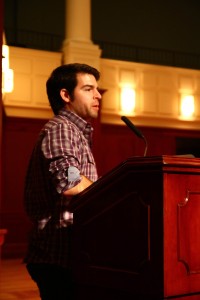Amy Reynolds
Correspondent
If anything’s true about independent filmmaking, it’s that it is no easy task and is extremely time-consuming.
Alumnus Drew Pearson came back to the College on Friday, Nov. 4 to show and discuss his most recent documentary about a Princeton football player who has had many serious medical setbacks.
The film began with a background of Jordan Culbreath’s life as both a hard-working student and a determined athlete. However, a couple of years into his football career at Princeton University, he was diagnosed with Aplastic Anemia, a condition in which his bone marrow does not replenish his blood cells.

“It was really hard to find out that I wouldn’t be playing (football) anymore and my career was over,” Culbreath said in the film.
After more than six months of therapy, Culbreath, as well as his family and teammates, were thrilled to discover that he would once again take the field, despite all previous doubts. In fact, the athlete even scored a winning touchdown for Princeton in overtime.
Pearson spoke about the difficult work and time involved in making the documentary.
“The most challenging part is doing it yourself, basically … you have to formulate it yourself,” he told the audience.
In two years, Pearson made approximately 10 trips to the outskirts of Washington D.C. to meet with the Culbreath family. In addition, nearly 100 hours of film had to be cut down to just a 40-minute documentary.
“It was a bigger project than I anticipated, but like I said, you gotta just go with it,” Pearson said at a documentary film workshop later in the day.
Pearson was filming Princeton football highlights when Culbreath was diagnosed, and it was the story of the season.
“It was pretty extraordinary,” Pearson said about how the story kept getting more and more in-depth. “Everything from there just kind of snowballed.”
As for funding — well, there was none.
“It came out of my own pocket, my own bank account,” Pearson said. “You just have to be really driven ... If you’re going to do something of this caliber, you have to accept that,” said Pearson.
At the workshop, Pearson gave advice to film students. He encouraged them to create close relationships with those who are being filmed and always to shoot more rather than less.
“If you have to ask yourself, ‘Should I shoot this?’ you probably should,” he said.
Pearson also stated that criticism should always be appreciated.
“Don’t put too much pressure on yourself to make something groundbreaking. The story makes itself,” he said.
Despite all the challenges of independent filmmaking, for Pearson, it’s a passion.
“With me it wasn’t really an artistic vision at all … but then as things go on, you just have to recognize what caliber story you’re working on,” he said. “There has to be a conflict … that’s where your artistic vision comes in.”






